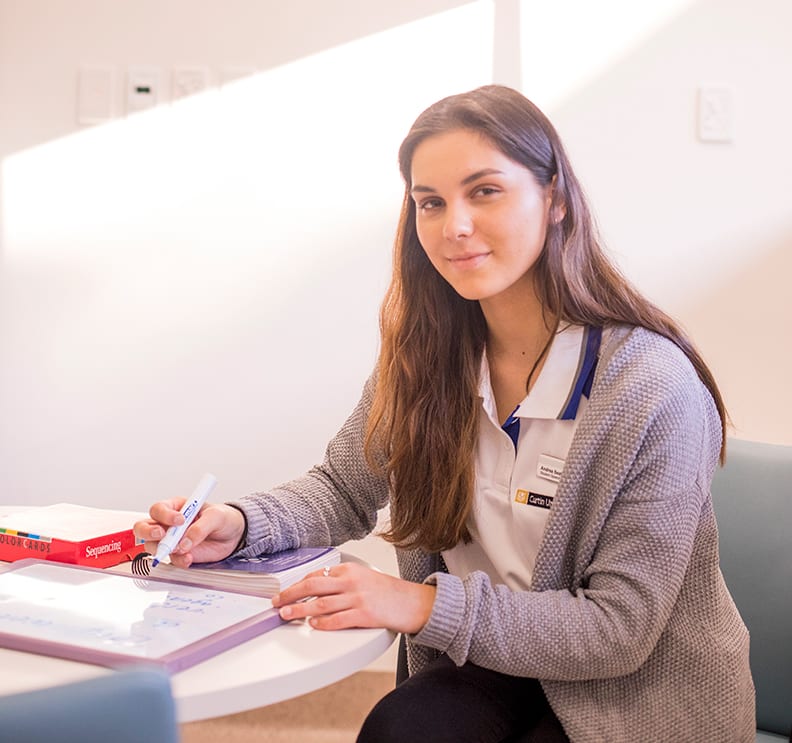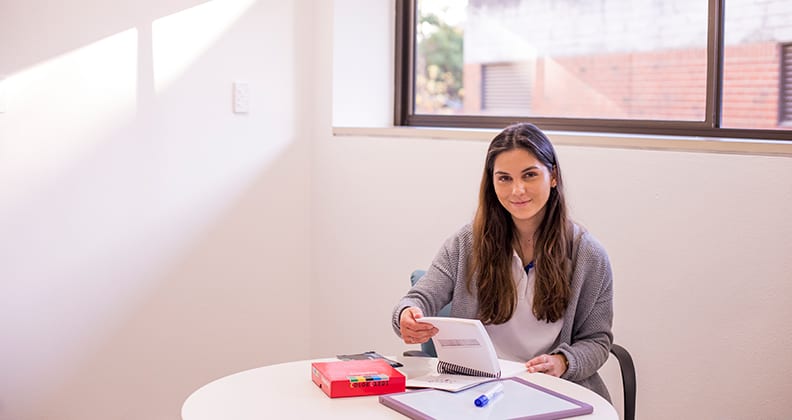Attending speech therapy as a child gave Andrea Seator an early taste for the art and science of speech pathology. Now a fourth year student in a Bachelor of Science (Speech Pathology), she has landed a job as a casual therapy assistant at one of the state’s leading service providers, Therapy Focus, and plans to work domestically and rurally when she graduates.
Andrea always knew a career in health sciences, with a practical application, would suit her. As a child requiring speech therapy, she gained firsthand exposure to what a speech pathologist does, an experience she drew on when making a decision about university study.
“I have always been interested in health sciences, and in particular I wanted to study a course that would be hands on and practical in an area of interest to me. When I was younger I used to attend speech therapy, so I had some understanding of what the role of a speech pathologist would involve,” she said.
As a first year student, Andrea was determined to make the most of opportunities to develop professional skills and began volunteering at Therapy Focus. She gained valuable experience in social therapy for children with language difficulties, and in supporting high profile fundraising events such as Telethon. Three years later, she joined the service as a paid employee, and now works as a casual therapy assistant (and continues to volunteer).
“I first began volunteering with Therapy Focus three years ago and, as of mid-2017, I’ve been working with them as a therapy assistant. I first volunteered for different events such as fundraisers at the World’s Biggest Play Day and Telethon, as well as assisting in social therapy groups such as ‘Lego groups’. As my experience around working with children with a range of communication skills grew, I was able to transfer this knowledge into my new role working as a therapy assistant,” Andrea said.
“I work with children who require repetitive and frequent language therapy, who are already currently receiving intervention from speech pathologists. I provide additional therapy time with the clients, in addition to the intervention that they currently receive with their speech pathologists, in order to maximise the efficacy of their allocated hours. Providing more frequent therapy is important in order for the clients to get more exposure to therapy and therefore the opportunity to improve.”
Andrea’s experience at Therapy Focus, while challenging at times, has been invaluable in helping to refine her understanding of what makes an effective speech pathologist.
“Working with children who experience different difficulties in regards to language, speech and literacy means that the therapy you are planning on providing isn’t necessarily the only therapy you will have in the session. Behaviour management, and addressing stigma and negative feelings around these difficulties, are just as important in order to have a successful session and overall impact. For myself, managing these other confounding factors has been the most challenging experience so far,” she said.
“Having a great rapport with your client, using the best evidence-based practice and considering the client’s goals are all important considerations that will make a successful speech pathologist. By having these considerations front-of-mind when making clinical decisions, you are doing what’s best for your client and are more likely to see success or reach the goals.”

As she nears the end of her degree, Andrea’s post-graduation career goals include gaining experience in a wide range of areas with a broad client base. She is optimistic about the varied career opportunities having a speech pathology degree will facilitate, and has a particular interest in working in rural areas and working overseas.
“Speech pathology paves the way for a very rewarding career working with other people in a caring and helping role. Career opportunities include working in aged care, hospitals, rehabilitation settings, schools, development centres and private practice. This wide variety allows students to find their niche, as well as provide management, whether it’s in speech, swallowing, language, fluency and other modes of communication. The essence of the degree is around communication and improving communication which may look different for different people,” she said.
“I would love to work with a wide range of people, whether that is children or adults, in a wide range of settings. I look forward to gathering knowledge and experience in working with a variety of populations to increase my overall clinical knowledge. I also have a keen interest in working in rural areas and internationally once I have gained enough experience.”
Therapy Focus is currently celebrating its 20th anniversary and profiles Andrea on its webpage.



